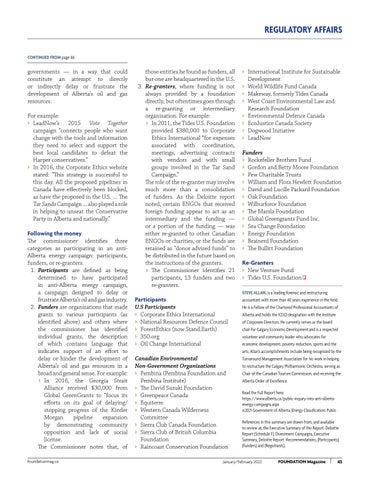REGULATORY AFFAIRS CONTINUED FROM page 46
governments — in a way that could constitute an attempt to directly or indirectly delay or frustrate the development of Alberta’s oil and gas resources. For example: LeadNow’s 2015 Vote Together campaign “connects people who want change with the tools and information they need to select and support the best local candidates to defeat the Harper conservatives.” ❯ In 2016, the Corporate Ethics website stated: “This strategy is successful to this day. All the proposed pipelines in Canada have effectively been blocked, as have the proposed in the U.S. … The Tar Sands Campaign … also played a role in helping to unseat the Conservative Party in Alberta and nationally.” ❯
Following the money The commissioner identifies three categories as participating in an antiAlberta energy campaign: participants, funders, or re-granters. 1. Participants are defined as being determined to have participated in anti-Alberta energy campaign, a campaign designed to delay or frustrate Alberta’s oil and gas industry. 2. Funders are organizations that made grants to various participants (as identified above) and others where the commissioner has identified individual grants, the description of which contains language that indicates support of an effort to delay or hinder the development of Alberta’s oil and gas resources in a broad and general sense. For example: ❯ In 2016, the Georgia Strait Alliance received $30,000 from Global GreenGrants to “focus its efforts on its goal of delaying/ stopping progress of the Kinder Morgan pipeline expansion by demonstrating community opposition and lack of social license. The Commissioner notes that, of foundationmag.ca
those entities he found as funders, all but one are headquartered in the U.S. 3. Re-granters, where funding is not always provided by a foundation directly, but oftentimes goes through a re-granting or intermediary organization. For example: ❯ In 2011, the Tides U.S. Foundation provided $380,000 to Corporate Ethics International “for expenses associated with coordination, meetings, advertising contracts with vendors and with small groups involved in the Tar Sand Campaign.” The role of the re-granter may involve much more than a consolidation of funders. As the Deloitte report noted, certain ENGOs that received foreign funding appear to act as an intermediary and the funding — or a portion of the funding — was either re-granted to other Canadian ENGOs or charities, or the funds are retained as “donor advised funds” to be distributed in the future based on the instructions of the granters. ❯ The Commissioner identifies 21 participants, 13 funders and two re-granters. Participants U.S Participants ❯ Corporate Ethics International ❯ National Resources Defence Council ❯ ForestEthics (now Stand.Earth) ❯ 350.org ❯ Oil Change International Canadian Environmental Non-Government Organizations ❯ Pembina (Pembina Foundation and Pembina Institute) ❯ The David Suzuki Foundation ❯ Greenpeace Canada ❯ Equiterre ❯ Western Canada Wilderness Committee ❯ Sierra Club Canada Foundation ❯ Sierra Club of British Columbia Foundation ❯ Raincoast Conservation Foundation
❯
❯ ❯ ❯
❯ ❯ ❯ ❯
International Institute for Sustainable Development World Wildlife Fund Canada Makeway, formerly Tides Canada West Coast Environmental Law and Research Foundation Environmental Defence Canada EcoJustice Canada Society Dogwood Initiative LeadNow
Funders Rockefeller Brothers Fund ❯ Gordon and Betty Moore Foundation ❯ Pew Charitable Trusts ❯ William and Flora Hewlett Foundation ❯ David and Lucille Packard Foundation ❯ Oak Foundation ❯ Wilburforce Foundation ❯ The Marsla Foundation ❯ Global Greengrants Fund Inc. ❯ Sea Change Foundation ❯ Energy Foundation ❯ Brainerd Foundation ❯ The Bullitt Foundation ❯
Re-Granters New Venture Fund ❯ Tides U.S. Foundation ❯
STEVE ALLAN, is a leading forensic and restructuring accountant with more than 40 years experience in the field. He is a Fellow of the Chartered Professional Accountants of Alberta and holds the ICD.D designation with the Institute of Corporate Directors. He currently serves as the board chair for Calgary Economic Development and is a respected volunteer and community leader who advocates for economic development, poverty reduction, sports and the arts. Allan’s accomplishments include being recognized by the Turnaround Management Association for his work in helping to restructure the Calgary Philharmonic Orchestra, serving as Chair of the Canadian Tourism Commission, and receiving the Alberta Order of Excellence. Read the Full Report here: https://www.alberta.ca/public-inquiry-into-anti-albertaenergy-campaigns.aspx ©2021 Government of Alberta |Energy Classification: Public References in this summary are drawn from, and available to review at, the Executive Summary of the Report, Deloitte Report (Schedule F), Divestment Campaigns, Executive Summary, Deloitte Report Recommendations, (Participants); (Funders) and (Registrants).
January/February 2022
FOUNDATION Magazine
45











